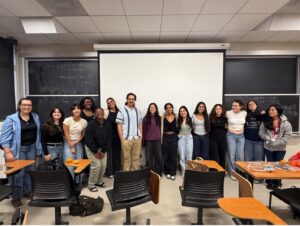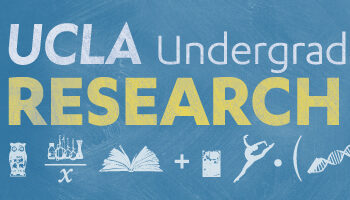
On May 20th, 2025, eighteen Disability Studies students participated in UCLA’s twelfth annual Undergraduate Research Week to highlight their disability studies research. While each project had different research methodologies and focused on different lived experiences of disability, each presentation emphasized the importance of expanding our understanding of ‘disability’ as a social issue. Each project highlighted the need for more access, inclusion, and direct engagement of individuals with lived experiences of disability. Here are two examples of the disability studies research that was presented.
The Effect of Sensory Pollution on Neurodiverse Individuals in the LA Area, was presented by graduating senior Anagha Srikanth under the guidance of Dr. Ariel Hernandez as part of the Disability Studies 191 Capstone Seminar course. Motivated by her experience as a Direct Support Professional, Anagha conducted an ethnographic study that included interviews and participant observation with neurodiverse individuals. Her research revealed that sensory pollution, unnatural or overwhelming environmental stimuli, such as noise or visual pollution. It has a significant impact on neurodiverse individuals’ well-being, resulting in increased fatigue, distractibility, and discomfort. Through her work, Anagha came to recognize the importance of acknowledging and addressing invisible barriers, such as sensory overload, in broader discussions of accessibility. This project stands as a meaningful contribution to conversations about environmental access and neurodiversity.
Unequal Access: Exploring the Role of Socioeconomic, Racial, and Geographic Factors in Autism and Speech Impairment Services in California, was presented by Elizabeth Cotillo as part of her final project for the Disability Studies 195CE internship course and internship with the UC Center in Sacramento. Drawing on both personal and professional experience in early childhood education and behavior intervention, Elizabeth analyzed statewide data to investigate how race, income, and geography impact diagnostic outcomes and access to services. Her research revealed significant disparities across California counties, particularly in underserved communities, underscoring systemic inequities in how children with communication-related disabilities are identified and supported.
Elizabeth’s project was selected for publication for UC Center Sacramento eScholarship platform and the UCLA Undergraduate Journal of Psychology, after receiving the Best Abstract Award at the Psi Chi Research Conference. She was also accepted to present this project at an additional conference, the UCLA Undergraduate Interdisciplinary Research Association (UIRA) Showcase. She plans to expand this work as part of her capstone research in collaboration with Dr. Leigh Harris, focusing on policy-driven solutions to improve access to early intervention services.
Together, these student-led projects reflect the depth and breadth of inquiry encouraged within UCLA’s Disability Studies program. From the early brainstorming topic ideas to the final projects, as the academic advisor I have had the privilege of witnessing the full journey of our students developing their capstone projects. It was rewarding to experience the entire progression and learn about the results of their research.
On behalf of the Disability Studies faculty and staff, we congratulate all our students on their exceptional work and for participating in the annual Undergraduate Research Week.



